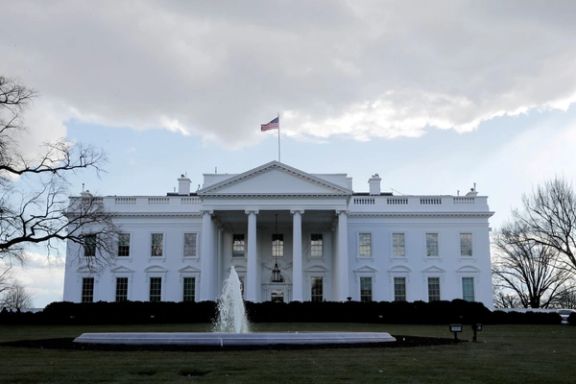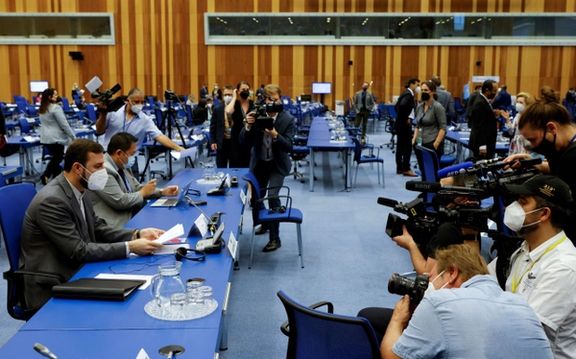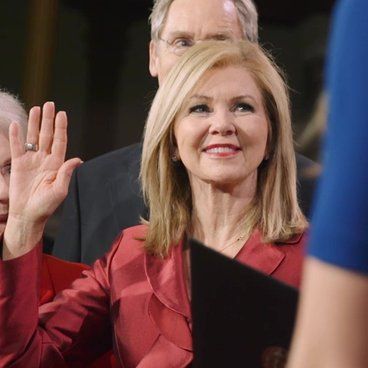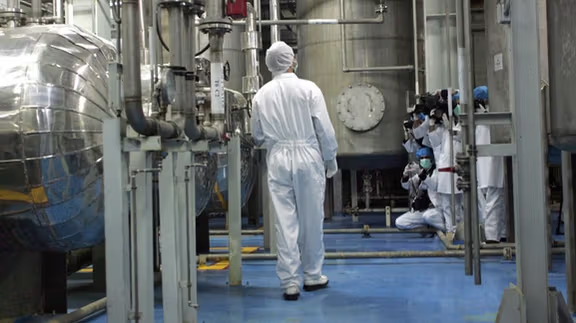US, Israel To Coordinate To Prevent Iran Getting Nukes

The United States and Israel have agreed to coordinate on efforts to prevent Iran from acquiring nuclear weapons and destabilizing the region, the White House said Wednesday.

The United States and Israel have agreed to coordinate on efforts to prevent Iran from acquiring nuclear weapons and destabilizing the region, the White House said Wednesday.
US National Security Advisor Jake Sullivan met with his Israeli counterpart Dr. Eyal Hulata and their respective senior representatives from foreign policy, military and intelligence agencies in Washington on Wednesday.
The meeting was part of coordination efforts within the framework of the US-Israeli Strategic Consultative Group (SGC).
Israel has been voicing concern over the Biden Administration policy of reviving the 2015 nuclear agreement with Iran, JCPOA, which would mean lifting economic sanctions, while Tehran pursues an aggressive regional policy against US allies in the region.
The year-long negotiations in Vienna to revive the deal stalled in March and Iran is said to have continued uranium enrichment to the point of now having enough fissile material to produce a bomb.
“The officials committed to coordinate on efforts to prevent Iran from acquiring a nuclear weapon and toward deterring Iran’s aggressive regional activities. They also discussed economic and diplomatic steps to achieve these goals and reviewed ongoing cooperation between the U.S. and Israeli militaries,” the White House said.
David Albright, a former United Nations nuclear inspector told Iran International Wednesday that Iran has reached a nuclear breakout point and much more pressure is needed to dissuade Tehran from pursuing weaponization. One part of such a pressure policy should be more US support for Israel and other allies in the region.

Iran’s nuclear breakout time has reached zero, but it is not clear how quickly it can assemble a nuclear weapon, a former UN inspector told Iran International.
In an interview on Wednesday, David Albright, founder and president of Institute for Science and International Security said the Islamic Republic has accumulated enough highly enriched uranium to make a nuckear weapon. He told Iran International's Fardad Farahzad, “Iran has reached this critical period where its breakout time is zero. And what that means is that now it has enough highly enriched uranium to fashion a nuclear weapon.”
However, assembling a nuclear weapon would take some additional time, Albright said and added, “But it may not be as long as some have argued. We don’t know how quickly Iran could make nuclear weapons today.”
While the United Nations' International Atomic Energy Agency (IAEA) has been monitoring Iran’s overt nuclear activities focused on uranium enrichment, the agency does not have full access to inspect every suspected military facility that might be engaged in weapons design and testing.
Albright, a physicist and an IAEA inspector in the 1990s, explained that the world does not know what kind of a nuclear device Iran would decide to make.

“They may choose to make a crude nuclear explosive to detonate underground, or to deliver it crudely or through crude methods like truck or ship. That could happen over the course of several months, less than six months. They may want, on the other hand, to focus on just building a warhead for a ballistic missile; that could take longer, a year or two. So again, the critical thing is that they have reached the zero-breakout time,” he explained.
Referring to Iran’s clandestine AMAD nuclear program in the 2000s, Albright said the plan was to accumulate enough fissile material to build five bombs, but once the secret was disclosed in 2002, Tehran abandoned the scheme under great international pressure. “So, in a way it's closer to nuclear weapons now than it was in the height of its crash nuclear weapons program in the early 2000s. So, this is a major milestone,” the former IAEA inspector said.
Iran has demonstrated that it could advance quickly in the absence of international restrictions on its nuclear program, Albright said, referring to the 2015 Joint Comprehensive Plan of Action, JCPOA, or any new version of it.

In addition to Iran's ability to quickly resurrect and advance its program, the JCPOA is “is very time-bound,” he said, referring to the sunset clauses of the original agreement, adding, “It doesn't last very long, so it's a temporary fix-at best. And there are some problems in getting in that deal.”
To stop Iran at this juncture could also take another strategy Albright said – the strategy of increasing pressure on Tehran. “It's not the Trump administration's maximum pressure campaign, it's much more. It would involve Europeans and the US and other allies working very closely together to increase pressure on Iran. It would involve stigmatizing Iran even more; like Russia's being stigmatized.”
Albright went on to say that a strategy of intense pressure would involve more support for Israel and other allied countries in the Middle East, “to push harder against Iran.”
He predicted that whether now or in the future the time will come for a tough pressure policy to stop the Islamic Republic from becoming a nuclear power.
“So, I think that's a path, and that's probably the path we're headed on. Maybe a nuclear deal could postpone this path, being launched for a few years perhaps. But there are real obstacles to getting that deal. And I think we are now headed into a period where pressure is going to increase on Iran.”

“Hope is not a national security strategy,” Senator Bob Menendez (D-NJ) said on Tuesday speaking about Washington's Iran policy and ongoing nuclear talks.
At a dinner by the American Israeli Public Affairs Committee of New Jersey, Menendez stressed the need for a new Iran strategy and an end to year-long negotiations with Iran to restore the JCPOA.
“It is time to tell the Europeans, who[m] we have shown good faith with, that we were willing to enter into what was hopefully a stronger and longer deal, that the Iranians are not there,” Menendez said according to Jewish Insider.
Menendez, who is the chairman of the Senate Foreign Relations Committee, first expressed misgivings about the Biden Administration’s Iran approach in a speech on the Senate floor in early February.
Menendez revealed in his remarks that he has demanded a classified hearing to find out what the administration’s strategy is and said, “in the absence of hearing a plan in a classified setting, then I intend to create… legislation that will ultimately dictate what a plan should be.”
The powerful Senate Democrat demanded that Biden should enforce oil export sanctions currently on the books against Iran. Since Biden’s election Tehran has increased its oil exports to nearly one million barrels a day, mostly in illicit shipments to China.
He also emphasized the need for military deterrence against Iran, “to defend our people and our interests"

The United States continues to discuss with European states a possible censure of Iran at next week’s board meeting of the United Nations nuclear watchdog.
Ned Price, the US State Department spokesman, said Tuesday it was important for the UN’s International Atomic Energy Agency to follow up what it deems Iran’s inadequate explanations of past nuclear work as Washington consults with “allies and partners.”
But Price said Washington still wanted agreement with Tehran over reviving the 2015 Iran nuclear deal, the JCPOA (Joint Comprehensive Plan of Action).
Earlier discussions between the US and Europeans over rebuking Iran at the IAEA board have reportedly concluded this might undermine efforts to achieve agreement over the JCPOA in the year-long talks between Iran and six world powers in Vienna that paused in March.
Rafael Mariano Grossi, the IAEA chief, said in a report this week that Iran had failed to deliver so far on assurances made in March to satisfy the agency by late June over outstanding issues in its pre-2003 atomic work.
While Price noted that these “unresolved safeguards issues,” referring to Tehran’s basic obligations under the Nuclear Non-Proliferation treaty (NPT), were “separate” from paused talks to revive the JCPOA, a tweet earlier Tuesday from Israeli prime minster Naftali Bennett appeared designed to stymie efforts to revive the JCPOA. Bennett revealed documents from 2004-5 that he said showed Iran using stolen IAEA files to “systematically evade nuclear probes.”
“We have always said that outstanding safeguards issue…need to be resolved,” Price said. “We have done what we believe together with our IAEA partners to be most effective in confronting Iran’s nuclear activities, including what is very clearly its past nuclear deception, just as we work with the IAEA to determine whether we can achieve a mutual return to compliance with the JCPOA.”
‘The Iranians are not there’
Price reiterated that an agreement to revive the JCPOA depended on Iran dropping “demands that go beyond the JCPOA,” apparently referring to Tehran’s argument that the US should remove the Revolutionary Guards (IRGC) from its list of ‘foreign terrorist organizations,’ so reversing a decision taken by President Donald Trump in 2019 the year after he withdrew the US from the JCPOA.
But Price insisted that agreement on reviving the JCPOA was “absolutely still within reach.”
Senator Bob Menendez, the Democrat chairing the Senate Foreign Relations Committee, called Tuesday for an end to any talks to revive the JCPOA. Speaking to a dinner in New Jersey organized by the American Israel Public Affairs Committee (Aipac), which has opposed the JCPOA, Menendez said it was “time to tell the Europeans, who[m] we have shown good faith with, that we were willing to enter into what was hopefully a stronger and longer deal, that the Iranians are not there.”
Both supporters and opponents of the Biden administration’s approach claim their arguments are strengthened by the IAEA reporting this week that Iran has now 43.3kg (95lb) of uranium enriched to 60 percent, an increase of nearly 10kg (22lb) in three months.
While a nuclear weapon requires uranium enriched to 90 percent, the step from 60-percent enrichment is fairly straightforward. Under the JCPOA, Iran enriched only to 3.67 percent, but began expanding its nuclear program, and reducing cooperation with the IAEA, after the US left the JCPOA in 2018 and imposed ‘maximum pressure’ sanctions.

A group of Republican lawmakers have reintroduced the Iran China Accountability Act aimed at prohibiting a nuclear deal until Tehran terminates ties with China and groups like Hamas.
Senator Mary Marsha Blackburn of Tennessee led the legislation jointly with Senators Rick Scott (R-Fla.), Bill Cassidy (R-La.), Marco Rubio (R-Fla.), Thom Tillis (R-N.C.), Mike Braun (R-Ind.), and Ted Cruz (R-Texas), while Congressman Bob Good (R-Va.) introduced the House version of the bill.
The bill is to impose certain requirements for the renegotiation or reentry into the Joint Comprehensive Plan of Action (JCPOA) or other agreements relating to Iran’s nuclear program, until the Islamic Republic can ensure the national security interests of the US and its allies are protected, by terminating strategic, security and military partnerships with China and stopping transfers of cash to proxy forces, including Hamas.
“The Obama-Biden Iran Deal has always been a failure. The Biden administration should not re-enter a deal that legitimizes the Iranian regime — especially while they continue to fund terrorism, endorse Communist China’s dangerous government, and facilitate genocide.
Describing Iran and China as two of America’s greatest adversaries that cannot be trusted, Senator Scott said, Iran chants ‘death to America’ and wants to destroy our great ally, Israel. Communist China will stop at nothing in its quest for world domination. These dangerous regimes, clearly emboldened by President Biden’s appeasement and desperate desire to re-enter the failed Iran nuclear deal, are working to gain a critical foothold in the Middle East.

Pressure is growing on Iran ahead of the United Nations nuclear watchdog’s 35-nation board meeting next week with the agency dissatisfied at Tehran’s cooperation.
France's foreign ministry on Tuesday urged Iran to assuage concerns reiterated Monday over Iran’s pre-2003 nuclear work in a report by the UN’s International Atomic Energy Agency director-general Rafael Mariano Grossi.
Israeli Prime Minister Naftali Bennett Tuesday tweeted several Iranian documents from 2004 and 2005, which he said Israel had acquired, that showed Iran had stolen IAEA classified documents and used the information to “systematically evade nuclear probes.” Bennett also tweeted an animation with green-uniformed, bearded Iranians hiding nuclear bombs from a blond-haired nuclear inspector.
One of the documents released by Bennett is a series of Iranian comments on a September 2005 report by then IAEA director-general Mohamed ElBaradei, which included his analysis of Iran’s -pre-2003 nuclear research. ElBaradei noted that while “good progress” had been “made in Iran’s correction of the breaches” in adherence to the Nuclear Non-Proliferation treaty (NPT), the agency would continue to press Iran for further explanations given its “experiments to acquire the know-how for almost every aspect of the fuel cycle” and “policy of concealment…until October 2003.”
The Iranian comments released by Bennett, in Persian and English translation, expresses Iran’s view that Tehran was under no legal obligation to answer queries it said were unrelated to the nuclear program therefore its commitments under the NPT.
Current IAEA director-general Grossi said in a report this week that Iran had so far failed to meet an agreement, made this March, to satisfy the agency over outstanding issues on this pre-2003 work with written replies by late March and answers to subsequent queries by June 21.
‘Obtained by intelligence measures’
Other documents, dated 2004, attached to Bennett’s tweet refer to ‘confidential’ IAEA material “obtained by intelligence measures,” suggesting that Iran had some prior knowledge of what agency inspectors might investigate.
These include notes on the need to change dates concerning the liquidation of Kimiya Maadan, a company managing a uranium mine, although quite how this affected the agency’s work remains unclear. The Wall Street Journal, which had earlier access to the documents tweeted by Bennett, cited “Middle Eastern intelligence officials” claiming that altering the date “allowed Iran to tell the IAEA that the work on the uranium mine, before May 2003, was done by Kimiya Maadan for the Atomic Energy Organization of Iran, supporting Iran’s assertion that the mine was civilian and separate from any military nuclear work.”
The Journal cited “Middle Eastern intelligence officials and former IAEA officials” that “Iran’s Ministry of Defense built the uranium mine, called Gachin, to be able to produce material for a potential nuclear-weapons program…”
‘Digging up old cases’
The 2005 ElBaradei report, while noting there were “no indications of undeclared mining or milling activities at Gahine [sic],” said the IAEA was “trying to achieve a better understanding of the complex arrangements governing the past and current administration of the Gchine mine and mill…[including] …how a turn-key project for a uranium ore processing plant could have been implemented by a newly founded company…in such a relatively short period of time.”
The purported Iranian comments on the ElBaradei report released by Bennett suggested the agency was “digging up old cases” and noted its interest in Tehran’s alleged “ties with a smuggling network.” Some analysts have long suggested that Iran before 2003 acquired equipment, including centrifuge parts, from the Pakistani nuclear scientist AQ Khan.